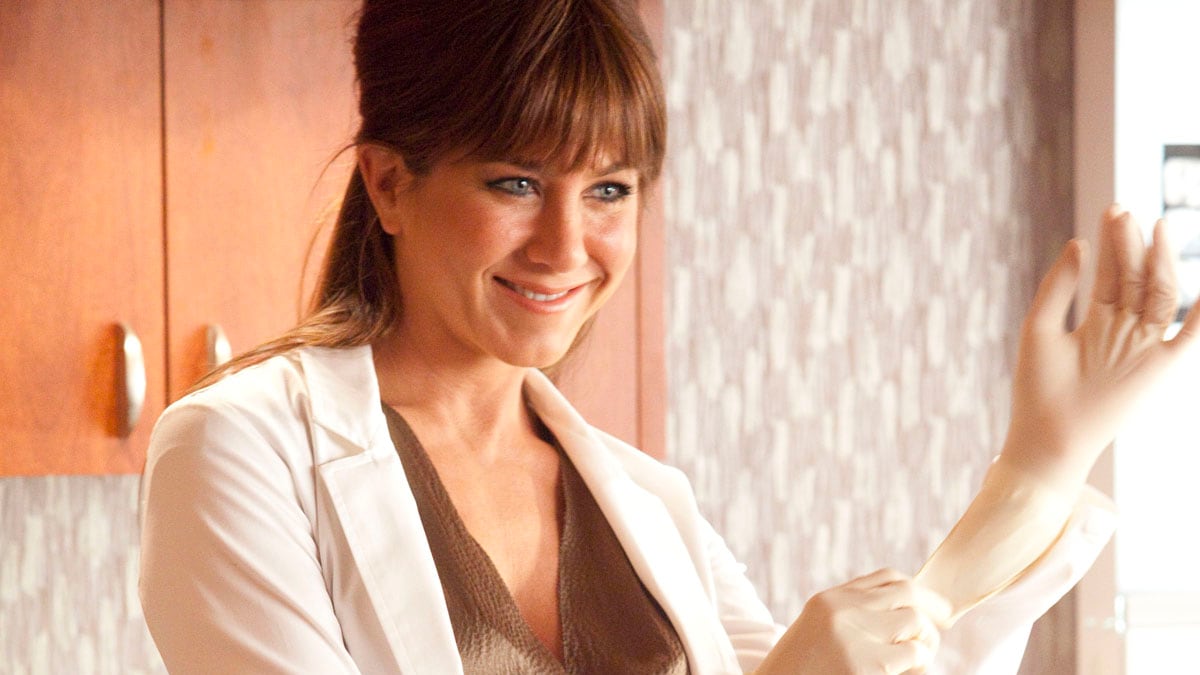In the new comedy Horrible Bosses, Jennifer Aniston plays an overbearing dentist named Julia who tortures her assistant Dale (Charlie Day) by sexually harassing him. She’s one of three managers (along with Colin Farrell and Kevin Spacey) meant to be so detestable that their underlings plot to murder them. She constantly corners Dale, asking him to perform lewd sexual acts. In one scene, Aniston’s character calls him into her office, wearing nothing but a white lab coat. When he expresses discomfort, she taunts him like a high-school bully. “You’re starting to sound like a little faggot there, Dale,” she says.
It will likely surprise many viewers to see the inoffensive Rachel from Friends say a word with such a fraught history, especially at a time when civil rights for gay people are seemingly reaching a tipping point in America. New York just legalized gay marriage, and a recent survey found that 57 percent of Americans aged 18 to 29 support gay marriage. And indeed, even as slurs go, the word represents treacherous territory. Though seldom heard now in films, many rappers use it with relative impunity in songs. Then there’s the basketball court, where an utterance can cost big-time: last April, when Kobe Bryant mouthed the word “faggot” to a referee at a basketball game, the NBA fined him $100,000, and the NBA commissioner called Bryant’s comments “inexcusable.”
So why is the other F-word coming out of Jennifer Aniston’s mouth? To hear the film’s writers tell it, the word illustrates how awful Aniston’s character is supposed to be. “She is a horrible person, so I think when it is coming out of her mouth, it is understandably offensive,” says John Francis Daley, the former star of Freaks and Geeks, who co-wrote Horrible Bosses.
His writing partner, Jonathan Goldstein, said: "It's indefensible. I think part of the challenge is to, in a fairly short amount of time, get these guys to a place where an audience can empathize….To shorthand that, we tried to think: what are the most offensive things they can say? Using a word like that I think is one of them. It says this woman is irredeemable."

In the film, there are plenty of other opportunities for Aniston to underscore the depravity of her character. The R-rated comedy is peppered with insults and Aniston's character is wildly explicit about sexual acts—some of which are done without the other party’s consent. “She didn’t have any objections,” Goldstein says. “She wanted to dive into this villain with both feet, and she did.” Still, the sensitivity of the topic seems undeniable. Warner Bros., the studio behind the film, would not comment about the line. Neither would Aniston nor the film’s director, Seth Gordon.
A few openly gay screenwriters, producers, and publicists said that a high-profile star like Aniston using that word, even in character, seemed like it could backfire. Others argued that the word could have been replaced by one that is less volatile—and still made the same point. “I just don’t know if everybody is thinking about the collateral damage they are creating,” says Dan Bucatinsky, the executive producer for the Showtime series Web Therapy headlined by another Friends star, Lisa Kudrow. “That’s a harder question for a screenplay writer. What’s going to happen when millions of people watch an actress who is supposed to be America’s Sweetheart say a word like that?”
It’s hard to imagine moviegoers siding with Aniston’s villainous character, who (spoiler alert) gets blackmailed in the end. The differing views underscore the extent to which “faggot” is a slur in transition—and more broadly, the evolving balance between prejudice and acceptance for gays in U.S. culture.
Larry Gross, a professor at USC and author of Up From Invisibility: Lesbians, Gay Men and the Media in America, says the use of the word is constantly changing. “To a large extent, people don’t know what the rules are,” Gross says. “In the case of the N-word, the rules have been made clear, even if they are complicated: African-Americans can use it and you can’t.”
In the past, the gay community has tried to reclaim the word “faggot” as a term of empowerment, although without much success. Larry Kramer’s 1978 novel Faggots explored the lives of gay men and was widely panned by the gay community.
Throughout the '90s, the use of the word became more prevalent as it evolved into a pejorative term that straight men used to insult each other, or assert their own masculinity. In 1993, Quentin Tarantino’s first film, True Romance, used the word twice. One character says, “I’m no fag, but Elvis was good-lookin’.” In some situations, the meaning of the word as it relates to homosexuals seems to have been completely lost. “I’ll say faggot all day,” the rapper 50 Cent said on CNN. “I don’t mean it as a direct thing against someone when I’m saying it. I’m just using it as slang.”
“You don’t have to be gay to act like a faggot,” Chris Rock has said in his stand-up routine. “It’s not the word. It’s the context of the word.”
Ann Coulter caused a ruckus in the political world when she called presidential hopeful John Edwards a “faggot” at a prominent conference for conservatives in 2007. When asked to clarify, she said, “Faggot isn't offensive to gays. It has nothing to do with gays…It's a schoolyard taunt meaning 'wuss,' and unless you're telling me that John Edwards is gay, it was not applied to a gay person."
Around that time, in 2006, Hollywood was confronted with the use of the word after a fight on the set of the TV show Grey’s Anatomy made headlines. During the altercation, actor Isaiah Washington reportedly used the slur against his costar T.R. Knight, who said when he heard the insult “something shifted, and it became bigger than myself.” He said the fight forced him to come out of the closet. Backstage at the Golden Globes a few months later, Washington denied calling Knight the slur, saying, “No, I did not call T.R. a faggot.” At the end of the season, his contract was not renewed.
In 2009, the South Park episode “The F Word” commented on the taboo nature of the word. The cartoon kids, who say throughout the episode they don’t associate the word with homosexuals, try to change its definition to use it as an insult against motorcycle bikers. “The F Word” was the 13th season’s highest-rated episode. The Gay & Lesbian Alliance Against Defamation noted that while the episode tried to change the definition of the word it “remains a hateful slur that is often part of the harassment, bullying, and violence that gay people…experience on a daily basis.”
Despite attempts to reframe the word “faggot,” some members of the gay community say they hope it will disappear. “We certainly have seen in the last 10 years, schools have started to realize homophobic language is not just wrong, it’s something that needs to be addressed with educators and youth,” says Daryl Presgraves, a spokesperson for the Gay, Lesbian and Straight Education Network. The organization’s “Think Before You Speak Campaign” discourages high-school and middle-school students from using it and tracks the number of times derogatory terms are used on Twitter every day. On Tuesday, July 5, “fag” was used more than 1,500 times.
In a climate of heightened sensitivity, a number of notable celebrities have sworn off the term completely. Last year, when Joe Rogan used the word on Twitter to describe a journalist, it prompted a lengthy discussion for the former Fear Factor host. Rogan admitted that his friends celebrated his 40th birthday with a cake for him that said, “Happy birthday faggot.” He also apologized for using it, and posted a YouTube video saying he was officially retiring the word as part of his vernacular: “It’s too confusing a word. I decided it’s not worth it.”
In February, shock jock Howard Stern made a similar vow. "I have tremendous compassion for people who are homosexual," he said. "I feel like they are bullied and abused in our society. I've put a lot of thought into this...I've tried to change my thought about that word. I've tried to stop using it."





